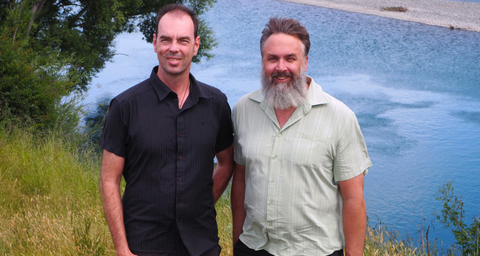02.02.2018
New Zealand: Wairau River research reveals impact on aquifer

Thomas Wöhling and Scott Wilson beside the Wairau River at Barnetts Bank
The Wairau Aquifer Project is unravelling the causes of declining groundwater levels and spring flows in the Rapaura and Renwick areas in recent years. The investigation is a joint effort by groundwater hydrologists from Council, Lincoln Agritech and the Technische Universität Dresden, Germany.
Dr Thomas Wöhling of Dresden University says about 95 % of the groundwater in the aquifer originates from the Wairau River.
“Although more than 220 million m³ of river water enters the aquifer each year, most is quickly discharged into springs like Spring Creek and flows out to sea. Only the top 5 % of the aquifer resource can be used for irrigation or drinking, without impacting on lowland spring levels,” he says.
The research team found that a decline in groundwater storage can be attributed to summer low-flow periods. “The number of low-flow days has nearly doubled in the past twenty years, which in part correlates to long-term climate oscillations, with below average rainfall in the river catchment reducing river flows,” he says.
Scott Wilson of Lincoln Agritech believes that based on these findings, groundwater levels could reach the point where spring flows are affected more frequently.
The project receives funding from the Ministry of Business, Innovation and Employment “Transfer Pathways” research programme. The research will now move on to the influence of in-stream river bed processes and flooding on aquifer storage.
Source: Marlborough Express Midweek, February 1st, 2018
